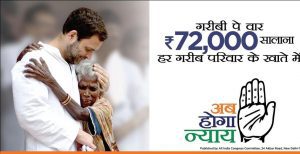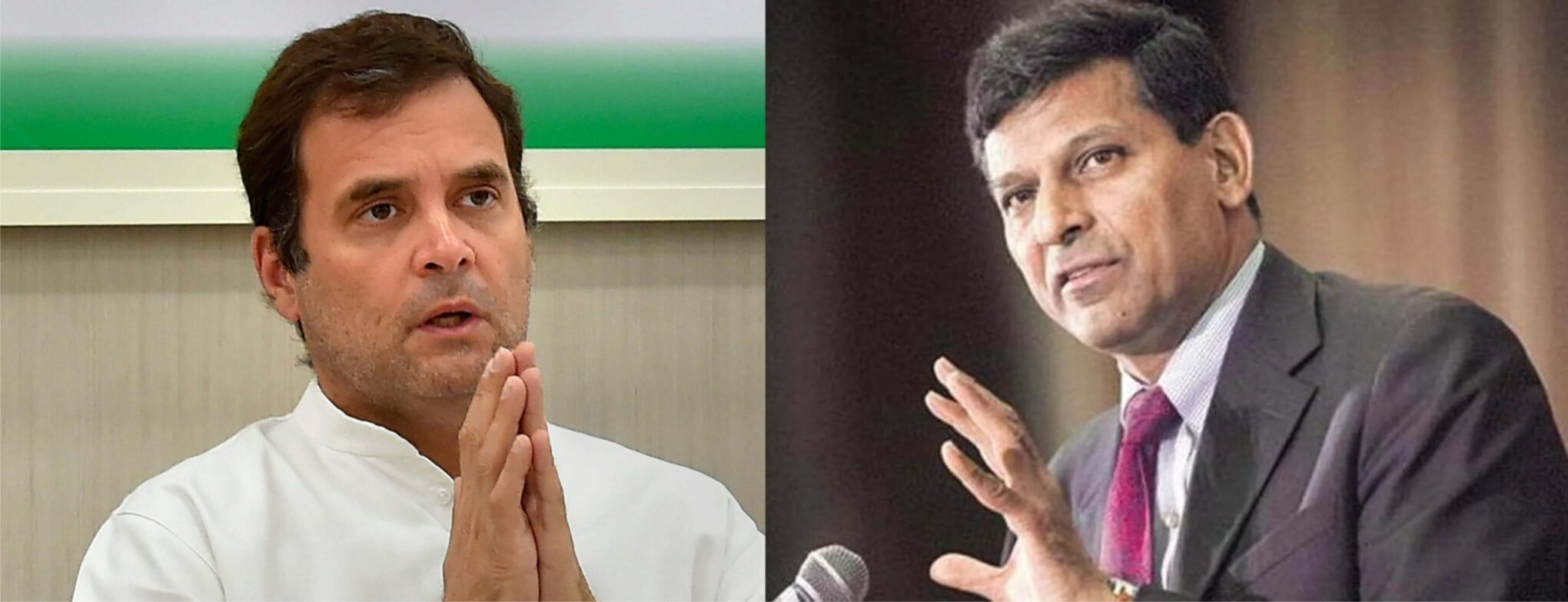Rahul Gandhi and former RBI governor Raghuram Rajan discussed the economic effects of COVID lockdown in a video chat. Rajan stressed that with 100 million people put out of work, India must open up the economy in a measured way. An analysis by Navodita, exclusively for Different Truths.
 Congress leader Rahul Gandhi and former RBI governor Raghuram Rajan discussed the economic effects of COVID lockdown in a video chat. Rajan stressed that with 100 million people put out of work, India must open up the economy in a measured way, and called for a relief package of Rs 65,000 crore.
Congress leader Rahul Gandhi and former RBI governor Raghuram Rajan discussed the economic effects of COVID lockdown in a video chat. Rajan stressed that with 100 million people put out of work, India must open up the economy in a measured way, and called for a relief package of Rs 65,000 crore.
The world is facing an unprecedented era of uncertainty and gloom. At the very beginning of the pandemic, Rahul Gandhi and the Congress party had made it very clear that we are here in solidarity with the Narendra Modi government and will help find answers.
The world is facing an unprecedented era of uncertainty and gloom. At the very beginning of the pandemic, Rahul Gandhi and the Congress party had made it very clear that we are here in solidarity with the Narendra Modi government
The government implemented some of the suggestions made by Sonia Gandhi, P. Chidambaram and Rahul Gandhi. A responsible leader does not wait for a calamity to take its toll and then lord over the debris of what is left behind.
Rahul Gandhi provides much-required leadership at a time when everything is seen through the prism of partisan politics. Raghuram Rajan and Rahul Gandhi spoke about the problems the country is facing and the possible solutions. While Rahul was frank in his observations of inequalities have increased over the decades, Raghuram Rajan spoke as an independent economist — as a professional.
Gandhi asked questions that were on everyone’s mind but they weren’t met with explicit suggestions. For example, Rajan said Rs 65,000 crore was required to help the poor but gave no explanation on how he arrived at that figure.
Gandhi asked questions that were on everyone’s mind but they weren’t met with explicit suggestions. For example, Rajan said Rs 65,000 crore was required to help the poor but gave no explanation on how he arrived at that figure. Besides, the Modi government has already provided Rs 28,256 crore through the Pradhan Mantri Garib Kalyan Yojana out of the total package of Rs 1.7 lakh crore.
Gandhi’s questions about “authoritarian governments” and centralised power structure in India were political enough to make one feel he is playing the role of opposition not quite in tune with what the opposition had set out to do — support the government in times of COVID.
As far as his estimate of Rs 65,000-crore package for the poor is concerned, many different numbers have been put forth by the likes of former CEA Arvind Subramanian and Devesh Kapur of Johns Hopkins University.
As far as his estimate of Rs 65,000-crore package for the poor is concerned, many different numbers have been put forth by the likes of former CEA Arvind

Subramanian and Devesh Kapur of Johns Hopkins University. That said, I wouldn’t be able to comment on how he arrived at this sum but given his expertise, it is not a number to be dismissed.
In the last few years, suggestions for or criticism of the Narendra Modi government have come to be seen as partisan or an attack. We have seen this whenever something comes up about data. Most recently regarding data on unemployment. I fear that we are perilously close to a situation where we cannot have rational discourse.
Also, it’s not out of our purview to be thinking of decentralisation and granting state powers to deal with the Covid-19 situation, which is proving to be more localised. We definitely need central responses, but decentralised power in this context is quite essential.
If the Narendra Modi government expected hosannas to be sung for its handling of the economy, Raghuram Rajan did not play ball.
If the Narendra Modi government expected hosannas to be sung for its handling of the economy, Raghuram Rajan did not play ball. Only a few economists will defend the Modi government’s performance.
Rajan’s impeccable credentials, his direction and leadership, if at all, have rarely been questioned at the RBI.
His suggestion for the government to take action against high-profile cases, where big businesses had loans outstanding against them, was one of the highlights. A parliamentary committee under former Union minister Murli Manohar Joshi had sought his inputs on the bad-loan crisis. It did not win him, friends.
Rajan was the man who had warned against the unfolding subprime crisis in the US. It unfolded into a global financial crisis. Clearly, his credentials as an economist were never in doubt.
Rajan was the man who had warned against the unfolding subprime crisis in the US. It unfolded into a global financial crisis. Clearly, his credentials as an economist were never in doubt.
The fortuitous turn of events, catapulting the BJP to power, is perhaps what has led to the criticism of Rajan. His reading of the economy, of falling demand, and higher cost of finance have, ultimately, proven correct.
Rajan has raised issues that have been critical of the BJP government, which have led to heightened criticism of him. He also suggested former finance minister Arun Jaitley to make the government rein in spending, which did not make him endearing.
In Rajan, Rahul found the voice of a credible, globally-respected economist to endorse every diatribe the Congress party has fired against the Centre in wake of the health pandemic and beyond it. That Rajan became a household name for India’s elite and middle-class during his stint as a popular RBI Governor (September 2013 to September 2016), only adds more firepower to the Gandhi scion’s accusations against the Modi government’s lack of preparedness in dealing with the pandemic and its economic cost.
In India’s deeply polarised political discourse, Rajan, of course, is in the same league of renowned economists like Amartya Sen, Abhijit Banerjee, Jean Dreze and others, who are reviled by the BJP and its supporters for prescribing policy measures that are at variance with the Hindu-right’s prescriptions.
 In India’s deeply polarised political discourse, Rajan, of course, is in the same league of renowned economists like Amartya Sen, Abhijit Banerjee, Jean Dreze and others, who are reviled by the BJP and its supporters for prescribing policy measures that are at variance with the Hindu-right’s prescriptions. It is, thus, no surprise that as soon as the Rahul-Rajan conversation went live on Facebook, YouTube and Twitter, there was a parallel coordinated campaign on these social media platforms to malign the economist.
In India’s deeply polarised political discourse, Rajan, of course, is in the same league of renowned economists like Amartya Sen, Abhijit Banerjee, Jean Dreze and others, who are reviled by the BJP and its supporters for prescribing policy measures that are at variance with the Hindu-right’s prescriptions. It is, thus, no surprise that as soon as the Rahul-Rajan conversation went live on Facebook, YouTube and Twitter, there was a parallel coordinated campaign on these social media platforms to malign the economist.
Let us not forget that Rajan was among the architects of the Congress party’s NYAY scheme, which Rahul had promised ahead of the Lok Sabha polls if his party came to power. Of course, the Congress lost badly at the hustings but the coronavirus pandemic has allowed Rahul to harp about the need for an NYAY-like scheme in these trying times to put money in the hands of India’s poor. The other speculation about Rajan during the Lok Sabha polls was that the Congress could have roped him in as finance minister if it had romped to power; another stillborn idea.
COVID times are going from bad to worse — it’s anybody’s guess how migrant workers and the poor are going to emerge out of this crisis.
Photo from the Internet






 By
By

 By
By